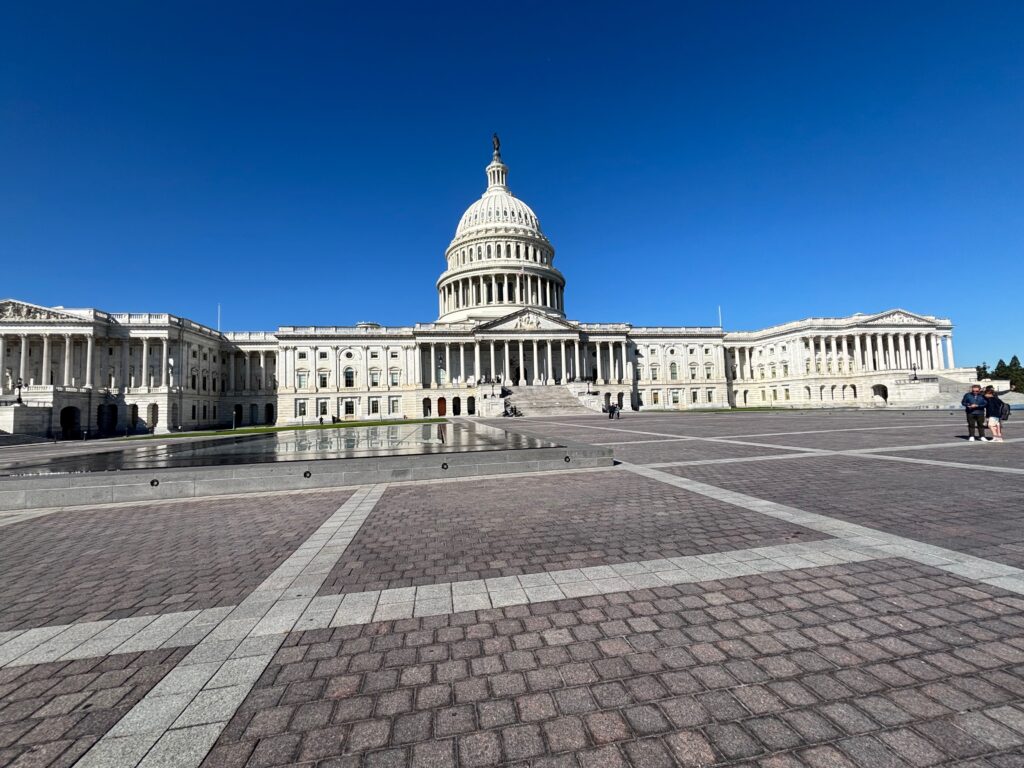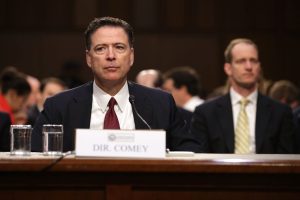The U.S. Capitol on Oct. 9, 2024. (Photo by Jane Norman/States Newsroom)
State officials from both parties urged Congress to avoid a government shutdown Monday, though Republicans were pushing harder for an extension of current funding.
Though they sometimes clash with federal directives, states depend on funding from the federal government for numerous programs. A government shutdown, which would have a wider effect than any in recent years because Congress has not passed any of the dozen annual funding bills, would delay or cancel that support.
The National Governors Association issued a statement Monday from its chair and vice chair, Oklahoma Republican Gov. Kevin Stitt and Maryland Democratic Gov. Wes Moore, calling on Congress to come together to avoid a shutdown. The bipartisan group comprising all the nation’s governors generally avoids commenting on controversial issues that divide its membership.
“The consistent use of political brinksmanship when it comes to our government funding does not serve our states, territories or our people well,” they wrote. “It is long past time to stop kicking the can down the road and return to the regular order of debating and passing a budget, but at this juncture, Congress has a responsibility to ensure the government remains operational. We urge federal leaders from both sides to work to set aside political games and pass a budget that reflects the values and promises states commit to every day.”
While members of both parties expressed a desire to avoid a shutdown, they proposed different solutions.
Republicans urged lawmakers to approve the “clean” continuing resolution to keep the government funded at current levels, while Democrats backed up their party’s position in Congress to seek an extension of health insurance subsidies in a funding bill.
“Allowing a shutdown would consequently and needlessly disrupt our economies, threaten public safety, and undermine public confidence in our institutions,” 25 Republican governors wrote in a Monday letter to congressional leaders. “Our families and communities would feel the pain with immediate effect and confusion.”
Partisan differences over shutdown extend beyond the Beltway
The U.S. House, where Republicans hold a majority, passed a stopgap spending measure this month, but it failed to clear the 60-vote threshold needed to pass the U.S. Senate, as Democrats have declined to support a proposal that does not address health care costs.
At the state level, the debate has fallen along similar lines.
“Put simply, a government shutdown should not be used as political leverage to pass partisan reforms — these are not chips Congress should be bargaining with,” the Republican governors wrote “The proposed budget extension is a straightforward, bipartisan solution. There are no gimmicks or partisan poison pills; it’s a clean, short-term funding measure that both parties have historically supported.”
Republican state attorneys general sent a similar letter, which noted a shutdown would affect state and local law enforcement.
Democrats throughout the country, though, echoed congressional messaging that Congress should extend the health care subsidies that were included in the 2010 health care law known as the Affordable Care Act, and take more steps to reduce the cost of health care. Republicans’ failure to include such provisions would put blame for the shutdown on the GOP, Democrats have said.
“Instead of supporting a plan that would lower costs and stop making health care more expensive, Senate Republicans are blindly following Donald Trump and pushing the country towards a devastating government shutdown,” Sen. Kirsten Gillibrand of New York, who chairs Senate Democrats’ campaign organization, said in a Sept. 19 statement.
In a press release last week, the Democratic Governors Association touted efforts by its members to call for extending subsidies.
“DGA Chair Kansas Governor Laura Kelly, Delaware Governor Matt Meyer, and New Mexico Governor Michelle Lujan Grisham called on Congressional Republicans to extend critical Affordable Care Act subsidies that 22 million Americans rely on and avoid a government shutdown,” the release read.
“Without action from Republicans in Congress, health care costs for hardworking Americans who rely on these subsidies will balloon by an average of over 75 percent.”





